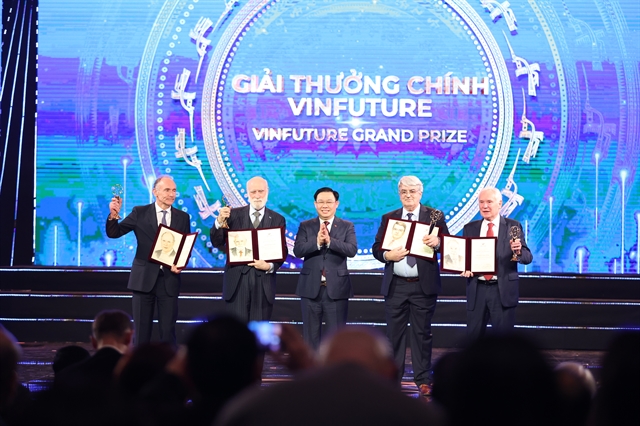This year, the VinFuture Prize attracted 970 nominations from over 70 countries across six continents.

Winners of the 2022 VinFuture Prize were unveiled yesterday night in Ha Noi, with the Grand Prize worth US$3 million awarded to five scientists for breakthroughs in global network technology, laying the foundation for modern socio-economic progress and future technological innovations.
The announcement ceremony was held at the Ha Noi Opera House with the participations of Chairman of the National Assembly of Viet Nam Vuong Dinh Hue, Vingroup President Pham Nhat Vuong, world scientists and other high-ranking officials.
The event featured performances by Grammy Award winner Christina Aguilera, conductor Honna Tetsuji, violinist Bui Cong Duy, conductor Dong Quang Vinh and other Vietnamese artists.

In his opening remarks, Professor Sir Richard Friend, Chair of the VinFuture Prize Council, said that the VinFuture Prize 2022 had received an impressive number of high-quality nominations in a wide range of fields from countries all over the world.
"The scientific works awarded are all research projects that have changed, and are continuing to change the lives of billions of people, and will serve as a strong foundation for sustainable development in the future," Friend said.
"It is my hope that the prize will contribute to promoting scientific research, create more breakthroughs that can positively impact society, and help build a better life for everyone. This is a mission and responsibility that we take very seriously."
Attending the ceremony, NA chairman Hue praised the success of the first VinFuture Prize and the contributions of researches to improve human lives, particularly work to develop coronavirus vaccines.
"If protecting health is the challenge of humanity in 2021, then ‘Reviving and Reshaping’ is the urgent problem that the world must face in 2022 and the following years. This is also the theme that the 2022 VinFuture set out after the COVID-19 pandemic, demonstrating VinFuture's vision and mission of science at the service of humanity," Hue stated.
The Grand Prize this year was given to Professor Timothy John Berners-Lee, Dr. Vinton Gray Cerf, Dr. Emmanuel Desurvire, Dr. Robert Elliot Kahn and Professor David Neil Payne.
Professor Timothy John Berners-Lee invented the World Wide Web, wrote the first web browser, and led the design and establishment of three critical internet standards including HTML, HTTP, and URLs. These have enabled the seamless sharing and use of information resources across the global internet.
Dr. Vinton Gray Cerf and Dr. Robert Elliot Kahn led the design and implementation of the Transmission Control Protocol and Internet Protocol (TCP/IP) which are the basis for the functioning of today’s internet.
Meanwhile, current global network technology relies on optical fiber communication, the development of which was enabled by the work, over five decades, of Sir David Neil Payne. His work related to fiber design, optical amplifiers, specialty fibers, and high-power lasers and amplifiers, together with the breakthrough work of Emmanuel Desurvire on Erbium-doped fiber amplifiers, made internet transmission possible on a global scale, thanks to their ability to boost high-speed optical signals repeatedly.

The British scientist David Neil Payne said that: "It is my honour to receive the VinFuture Award - which recognises the efforts of those who change the world for the better. The birth of the global internet to help the world operate during the last pandemic was a combination of the technology you just saw on stage and the success of wireless security protocols, software, and connecting to thousands of millions of kilometres of optical fibre cables."
"To me, the greatest accolade is recognition by my peers, by other scientists. To be on the same platform with Tim Berners-Lee, Vinton Cerf, and other prize winners is absolutely incredible for me. As I'm approaching the end of my career, I can now look back and say, I did something that changed the world. That is important to me."

Three Special Prizes, each valued at US$500,000, were awarded to innovators in emerging fields, female innovators, and innovators from developing countries.
Of which, the Special Prize for “Innovators with Outstanding Achievements in Emerging Fields” was awarded to Dr. Demis Hassabis and Dr. John Jumper for their pioneering work on AlphaFold 2, an artificial intelligence programme that has revolutionised the modeling of protein structures, accelerating advances in biomedicine, health, and agriculture.
The Special Prize dedicated to “Female Innovators” was awarded to Professor Pamela Christine Ronald for her breakthroughs in isolating the Sub1A gene which facilitated the development of submergence tolerant rice varieties, helping feed millions of people in South and Southeast Asia. In this region of the world, four million tonnes of rice enough to feed 30 million people is lost to flooding each year.

And the Special Prize dedicated to “Innovators from Developing Countries” was awarded to Professor Thalappil Pradeep for his development of a low-cost filtration system to remove arsenic and other heavy metals from groundwater, helping hundreds of millions of people around the world living with contaminated water get access to clean water.
This year, the VinFuture Prize attracted 970 nominations from over 70 countries across six continents. — VNS





